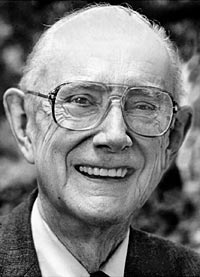UC Berkeley Press Release
Andrew Imbrie, music professor and renowned composer, dies at age 86
BERKELEY – Andrew Walsh Imbrie, a University of California, Berkeley, professor emeritus of music and a renowned composer, died Wednesday, Dec. 5, at his Berkeley home following a long illness. He was 86.
 Andrew Imbrie (Kathleen Karn/UC Berkeley photo) |
His pieces were performed at UC Berkeley throughout his career.
Former San Francisco music writer Robert P. Commanday described Imbrie's music as "unique and individual, independent of any trend, current or school."
"I don't like to predict what a piece is going to be; I let ideas go where they lead," Imbrie was quoted as telling The Oakland Tribune in 1977. "I am in a constant state of dialogue with my material. It talks back, and you have to fit its demands. You lay yourself open to subconscious suggestion."
Born April 6, 1921, in New York City, Imbrie began studying the piano at the age of four. In 1937, he studied in Paris with Nadia Boulanger, a French composer, conductor and music professor. He returned to the United States the following year and attended Princeton University, where he worked with composer and professor Roger Sessions, who became his mentor. Imbrie earned his undergraduate degree at Princeton in 1942 and his senior thesis, a string quartet, was recorded by the Julliard Quartet.
Imbrie served in the U.S. Army Signal Corps from 1942-1946 as a second lieutenant, working as a translator of Japanese.
He moved to Berkeley in 1946 to study with Sessions, who had begun teaching at UC Berkeley. Imbrie earned his M.A. in music at UC Berkeley in 1947, and joined the faculty in 1949.
In addition to teaching music composition, theory and analysis at UC Berkeley, Imbrie was a visiting professor at the University of Chicago, Northwestern University, New York University, Brandeis University, Harvard University and the University of Alabama. He also taught at the San Francisco Conservatory, the Sand Point Music Festival and Tanglewood Music Center.
Imbrie's colleague and friend, Olly Wilson, a UC Berkeley professor emeritus of music, said Imbrie was a "gracious, perceptive teacher" and composer who was generous with his time, knowledge and skill.
Imbrie's commissions included the New York Philharmonic, the San Francisco Symphony and Opera, the Halle Orchestra of England, the Francesco Trio, the Pro Orte Quartet, and the Ford and Naumburg foundations.
Awards earned by Imbrie included the Prix de Rome, the New York Music Critics Circle Award, a National Institute of Arts and Letters grant, two Guggenheim fellowships, a Boston Symphony Orchestra Merit Award, an Alice Ditson Fellowship, the Walter W. Naumburg Recording Prize, and the first Walter Hinricksen Award. Imbrie also received the New York Music Critics Circle Award in 1994 for the first of his five string quartets, written while he was a student at Princeton.
He also was elected to the National Institute of Arts and Letters, and was honored with a week-long celebration of his work in San Francisco in 1985.
Imbrie received a commission from the San Francisco Symphony in 1981 for a choral and orchestral work shortly before his son, John, an athlete, musician and Princeton University freshman, unexpectedly collapsed and died. He wrote "Requiem" in his son's memory, using texts from the Latin funeral mass and the poem "To the Evening Star" by William Blake, John Donne's "Death Be Not Proud," and "Prayer" by George Herbert.
With "Prometheus Bound," a work for orchestra, chorus and dance (1980), Imbrie presented the Greek tragedy about the character of Prometheus, who stole fire from Zeus and gave it to mortals. He said that the story has "haunted the conscience of Western civilization for 2,000 years" and while it has been "pressed into service as a symbol, whether humanist, existential, Marxist or Christian ... I regard the whole thing as a study of courage and defiance in the face of injustice."
Imbrie also composed such works as "A Hawk for Peace" and "Here We Stand," which celebrated the survival of redwood and oak trees threatened by a highway.
He received the Berkeley Citation, UC Berkeley's highest honor, in 1991.
Shortly before Imbrie's 1991 retirement, the San Francisco Symphony performed his piece "Legend," and the UC Berkeley Music Department hosted a concert of his chamber music in Hertz Hall on campus. One of the pieces performed in Hertz Hall was Imbrie's "Piano Sonata," which he composed while at the American Academy in Rome in 1947.
In honor of his 85th birthday year, a Wednesday Noon Concert last year on campus featured compositions by Imbrie and his student, Hi Kyung Kim. The featured pianist was famed Japanese musician Aki Takahashi, who played with Bay Area pianist Rae Imamura.
After retiring, Imbrie continued to produce new works and completed four new pieces, including "Sextet for Six Friends," which was performed in San Francisco, Mill Valley and Sonoma in February 2007 by the Left Coast Chamber Ensemble. Early next year, clarinetist Richard Stoltzman and the Borromeo String Quarter will perform a clarinet quintet's first movement that Imbrie just completed in November.
Survivors include his wife, Barbara Imbrie of Berkeley, and a son, Andrew Philip Imbrie, of Santa Clara, Calif. A funeral service took place on Wednesday (Dec. 12) at St. Clements's Episcopal Church in Berkeley.

